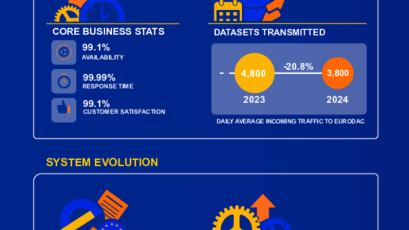Actions

On 5 April 2022, eu-LISA hosted its annual meeting with the Justice and Home Affairs (JHA) Counsellors and other stakeholders.
Executive Director, Mr Krum Garkov welcomed Counsellors on the occasion of eu-LISA's 10th Anniversary and thanked them for good cooperation over the years. Management briefed the Counsellors on the Agency's ongoing activities and projects as well as the developments ahead.
eu-LISA is progressing well with the development and operational management of the new EU border management and internal security systems, EES (the Entry/Exit System), ETIAS (the European Travel Information Authorisation System) and the interoperability framework, in spite of the challenges arising from the COVID-19 pandemic and shortages in supply chains. In addition, the evolution of SIS (the Schengen Information System), VIS (the Visa Information System) and Eurodac (the European Asylum Dactyloscopy Database) continues according to the plans.
At the meeting, eu-LISA's fundamental role in the implementation of the EU Security Union Strategy 2020-2025 was discussed. The development of new large-scale IT systems and their interoperability architecture, places eu-LISA in the middle of the development of the EU's new security ecosystem. The Agency is enhancing its capabilities in the area of cybersecurity and continues to take part in the EU's priorities such as the fight against serious and organised crime within EMPACT (The European Multidisciplinary Platform Against Criminal Threats). In the future, eu-LISA's role is expected to increase with responsibilities under Prüm II and the revised API Directive (Advance Passenger Information), amongst others. Through these initiatives, through research and innovation, and by accelerating a digital transformation in the justice and home affairs domain overall, eu-LISA is working at the core of building a 'Strong European Security ecosystem' – a key pillar of the Security Union Strategy.
Since 2020, eu-LISA has been contributing to the digitalisation of the justice domain, most notably with regard to ECRIS-RI (The European Criminal Records Information System Reference Implementation) and ECRIS-TCN. In the coming years, the Agency will further expand its contribution to justice by continuing the development and maintenance of e-CODEX and proposed developments and the management of the Joint Investigation Teams collaboration platform, amongst other initiatives.
One of the important topics discussed at the meeting was the Agency's activities in the field of research and innovation. In 2021, the eVisa Prototype Project was completed to demonstrate the feasibility of an EU online visa application platform. Within the EU Framework Programme for Research and Innovation, the Agency supported DG HOME in its activities connected to the Community of European Research and Innovation for Security (CERIS). Furthermore, several actions were undertaken to advance towards practical implementation of Artificial Intelligence (AI). eu-LISA has also actively been involved in the work of the EU Innovation Hub for Internal Security - an initiative launched in 2020 by the Council's Standing Committee on Operational Cooperation (COSI), under the coordination of Europol.


